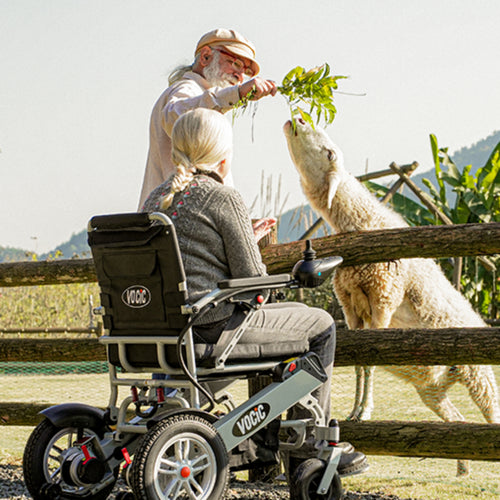Falls are a growing concern among the older adult population and their importance is often underestimated. As society ages, it is becoming increasingly important to study the causes, consequences, and preventive measures of falls in older adults. In 2023, more than 14 million (one in four) adults aged 65 and older (older adults) will report falls each year in the United States.
While not all falls result in injury, approximately 37% of those who fall will report an injury requiring medical treatment, resulting in approximately 9 million fall-related injuries[Source: Centers for Disease Control and Prevention (CDC)].
This statistic undoubtedly raises concerns and worries, especially among those with elderly loved ones. In this article, we will explore the issues surrounding falls in older adults, unraveling the triggers behind these accidents and revealing their wide-ranging effects on physical and emotional health.
The Causes of Falling Suddenly Elder

Physical Factors
As people age, their bodies tend to undergo more pronounced changes that increase the likelihood of falls. Muscle weakness and atrophy may affect their ability to maintain balance and coordination, while decreased bone density can make bones weaker and thus more prone to fracture in the event of a fall. Decreased joint flexibility and age-related visual impairment can further increase the risk of falling or tripping.
Together, these physical factors emphasize the importance of maintaining muscle strength, preserving bone health, and ensuring regular vision screenings as integral components of a fall prevention strategy.
Medications and Chronic Medical Conditions
Elderly individuals frequently contend with the use of multiple medications, a phenomenon known as polypharmacy. Regrettably, some of these medications come with side effects, including dizziness or drowsiness, which can markedly heighten the risk of falls.
Furthermore, persistent medical conditions such as cardiovascular problems, neurological disorders, and diabetes can diminish an individual's capacity to sustain balance and stability. Therefore, it becomes imperative to exercise vigilance in the management of medications and maintain close monitoring of chronic conditions. These actions represent pivotal measures in the prevention of falls among the elderly.
Environmental Hazards and Lifestyle Factors
Environmental dangers lurking within the home can pose substantial threats to elderly individuals grappling with balance issues. These hazards encompass clutter, inadequate lighting, slippery floors, and uneven surfaces, all of which significantly elevate the risk of debilitating falls. Furthermore, leading a sedentary lifestyle can result in the gradual decline of physical fitness and strength, thereby escalating the vulnerability to falls.
Cognitive impairments, inclusive of memory loss and impaired decision-making, can further compound the risk by potentially overlooking or neglecting these lurking dangers. Thus, it becomes paramount to directly confront and mitigate these environmental hazards while simultaneously championing an active and health-conscious way of life.
This combined effort holds the potential to wield a substantial impact in curbing the prevalence of falls among the elderly, ultimately cultivating a safer and more secure living environment.
The Consequences of Falls in the Elderly

Falls among the elderly have far-reaching and multifaceted consequences that permeate various aspects of their lives:
Physical Injuries
Falls often result in a range of physical injuries, from fractures and sprains to bruises and head trauma. Hip fractures, in particular, are distressingly common and can lead to a significant loss of mobility and independence.
Recovery from these injuries is often a protracted and challenging journey, necessitating rehabilitation and, at times, surgical intervention. Furthermore, physical injuries can exacerbate pre-existing health conditions, compounding the complications faced by the elderly.
Emotional Impact
The emotional toll of falls on the elderly should not be underestimated. The fear of experiencing another fall can give rise to anxiety and erode self-confidence. This fear can translate into self-imposed restrictions on physical activity and social engagement, ultimately fostering feelings of isolation and depression. The emotional distress experienced can corrode overall well-being, impinging on the elderly person's capacity to savor life to the fullest.
Reduced Quality of Life
The consequences of falls can significantly erode the overall quality of life for elderly individuals. Chronic pain stemming from injuries can inflict persistent discomfort and restrict participation in daily activities. Additionally, the loss of independence and mobility can trigger emotional distress and disrupt an individual's sense of purpose and happiness.
Healthcare Costs
Falls often entail substantial healthcare costs, encompassing hospitalizations, surgeries, medications, and rehabilitation services. These expenses can exert a considerable financial strain on both the elderly person and their family. In some cases, long-term care or assisted living arrangements may become necessary, further augmenting the financial burdens.
Increased Risk of Future Falls
One of the most disconcerting consequences is the heightened risk of future falls following an initial incident. Elderly individuals who have experienced a fall become more vulnerable to subsequent falls due to both physical and psychological factors. This establishes a daunting cycle of vulnerability that can prove challenging to break without the appropriate intervention and preventive measures.
Recognizing the intricate web of consequences underscores the paramount importance of implementing fall prevention strategies. These measures encompass regular medical check-ups, home modifications aimed at reducing hazards, and exercise programs tailored to bolster strength and balance.
By addressing the physical, emotional, and financial repercussions of falls, we can take significant strides toward enhancing the quality of life for our elderly loved ones and fostering a safer and more secure living environment.Or you may want to consider purchasing a rollator walker for seniors to help keep your family safe!
Keep reading: The best Lightweight Rollator Walkers for Seniors
What Is the Life Expectancy After a Fall in the Elderly?

Life expectancy after a fall can vary greatly among older adults, depending in large part on the severity of the injuries sustained. Minor accidents, such as bruises or sprains, usually have minimal impact and can quickly return to previous health. However, serious injuries such as hip fractures can dramatically reduce life expectancy.
Broader factors such as an individual's age, underlying health problems, and access to timely and effective medical care can also have a significant impact on life expectancy after a fall. Younger, healthier older adults may recover more effectively from fall-related injuries, with less impact on their overall life expectancy.
However, for older adults with chronic conditions such as diabetes, heart disease, or osteoporosis, falls may exacerbate these problems, leading to a more complex and lengthy recovery process.
What to Do When the Elderly Keep Falling?

Addressing the problem of repeated falls among older adults requires a proactive approach to their safety and well-being. The following are key steps to consider:
Home Safety Assessment
Start by assessing your home to identify any potential hazards. Fix or adjust things that could cause tripping, such as loose rugs or cluttered walkways. Make sure every area of your home is well-lit, especially at night. If extra support is needed for balance, consider installing grab bars or handrails in key areas such as the bathroom.
Utilize Assistive Devices
If it's a balance or mobility issue, consider working with a physical therapist or occupational therapist. Or purchase aids such as crutches, walkers, or wheelchairs. These tools can increase your stability and prevent falls.
Embrace Exercise and Physical Therapy
Foster a commitment to regular exercise routines that target the enhancement of strength, balance, and flexibility. Engaging in physical therapy or balance training programs can be especially advantageous and may serve to diminish the risk of future falls.
Vision and Hearing Assessment
Prioritize periodic eye and hearing examinations. Rectifying vision or hearing impairments can significantly contribute to improved spatial awareness and a concomitant reduction in the risk of falls.
Maintain Nutrition and Hydration
Ensure that the elderly person adheres to a balanced diet and remains adequately hydrated. Proper nutrition plays a pivotal role in sustaining muscle strength and overall health, thereby mitigating the risk of falls.
Establish Regular Check-Ins
Consistently monitor the well-being of the elderly individual, either through in-person visits or other communication channels. Vigilantly observe any changes in their condition and encourage them to promptly report any new falls or near-falls.
Develop an Emergency Response Plan
Devise a comprehensive emergency response plan to be enacted in the event of a fall. Confirm that the elderly person has easy access to a phone or a personal alarm system for summoning help when necessary. Discuss the plan with family members or caregivers to ensure a coordinated response.
Consider Caregiver Support
In cases where it becomes necessary, contemplate enlisting the assistance of a caregiver or home healthcare professional. They can provide valuable support with daily activities, fostering the safety and well-being of the elderly person.
Recognizing the uniqueness of each situation is critical, and actions taken should be tailored to the individual's health status, specific circumstances, and the underlying cause of the fall.
Conclusion
In summary, addressing recurrent falls in older adults is critical to their well-being and safety. Falls can have serious physical and psychological consequences that affect their quality of life. By seeking medical evaluation, checking medications, ensuring home safety, and promoting exercise and nutrition, we can reduce the risk of falls.
Involving healthcare professionals, caregivers and older adults in decision-making is critical, and implementing these measures can create a safer environment. Approaching repeated falls in older adults with diligence and compassion is key, as falls often signal underlying health problems.
By providing unwavering support, open communication, and collaboration, we can improve their quality of life and safety and allow them to age with dignity and independence.Explore mobility aids at VOCIC for more help.







